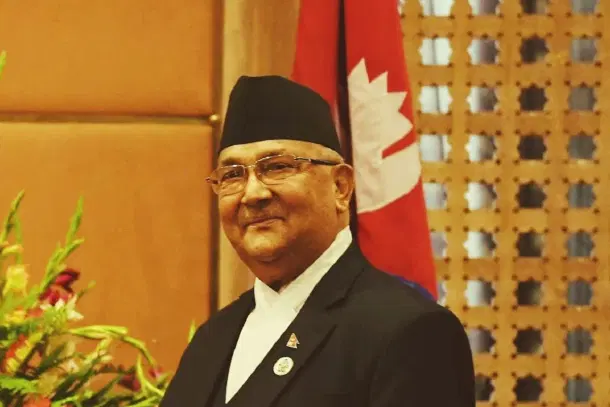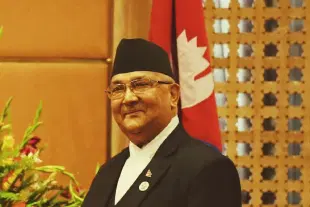Context
Nepal’s Pro-China Communist Leader Flirts With Hindutva For Upcoming Election
S Rajesh
Oct 11, 2022, 03:31 PM | Updated 03:31 PM IST
Save & read from anywhere!
Bookmark stories for easy access on any device or the Swarajya app.


‘Hindutva’ seems to be on Nepal’s former prime minister KP Sharma Oli's mind.
Context: It is to gain an edge over his political rivals in the provincial and federal elections in the Himalayan nation slated for 20 November.
Oli heads the Communist Party of Nepal (Unified Marxist Leninist) or CPN(UML).
He is facing the ruling five-party alliance headed by the Nepali Congress, which includes his rival communist party — the Communist Party of Nepal (Maoist Centre) or CPN(MC).
Oli’s hunt for allies to take on the alliance in the polls has led him to the doors of the Hindu-nationalist Rastriya Prajatantra Party (RPP) and the Rastriya Prajatantra Party Nepal (RPPN).
He is set to forge alliances with the two, who advocate Nepal’s return to the status of a ‘Hindu state’ and a ‘constitutional monarchy’.
Quote. “Oli has been a failure as a prime minister. He had been criticised strongly for being whimsical and authoritarian, and his public standing and approval had gone down a lot. So, he thought that adopting a pro-Hindu posture would help him regain lost ground.” — Kul Bahadur Chettri, political analyst.
Changes in Nepal’s constitution? On top of the RPP and RPPN’s agendas is the scrapping of the term ‘secular’ from Nepal’s Constitution and making the country a ‘Hindu state’ once again.
Nepal was proclaimed as a secular state in the country’s interim Constitution drawn up in 2006.
This was ratified in the final Constitution drawn up in 2015.
Will Oli support? Oli is unlikely to agree to the demands of his prospective allies to make the nation a Hindu state. However, he may concede to passing laws (if he becomes the PM again) making conversions of Hindus to Islam or Christianity illegal.
Nepal has seen massive conversions of Hindus to Christianity since the April 2015 earthquake that devastated the country.
Christian missionaries and aid organisations gained unrestricted entry into the country in the name of providing relief and promptly engaged in converting poor Hindus, especially in the rural areas.
Hardline Muslim organisations have also been converting Hindus, reportedly by force and allurements.
First time with Hindutva? No, it goes back to the end of Oli's tenure as PM.
In 2021, he created a sensation by claiming that Ram was born in Chitwan district of Nepal and not Ayodhya.
He asked the district authorities to build a grand temple at what he claimed was Ram’s birthplace.
He sanctioned a large sum of money for the proposed temple, a move that drew a lot of flak at a time when the country was facing the pandemic.
Though many felt that Oli’s claim was meant to irk India, sources close to him told Swarajya that the assertion was primarily aimed at bolstering his waning popularity and wooing Hindus.
Supreme irony. Oli also claims to be a diehard communist and atheist.
He is very close to China’s communist bosses.
It was Oli who, despite appeals, refused to delete the ‘secular’ term from Nepal’s final Constitution in 2015 when he was PM.
Incidentally, it was his stewardship of the new Constitution that brought Oli into a direct confrontation with New Delhi.
Thanks to Oli, China has a lopsided presence in, and influence over, Nepal today.
Coming closer to the Indian establishment. After losing power in July last year, Oli started mending fences with India.
He has even reached out to the BJP top leadership.
If he can create the perception that he is close to the ruling party in India, his support among Nepal’s Hindus may rise. That's the plan.
Bottom line: While it remains to be seen if Oli’s Hindutva gamble will pay off, what’s interesting is Nepal’s communist leader is turning to religion to return to power.
S Rajesh is Staff Writer at Swarajya. He tweets @rajesh_srn.





